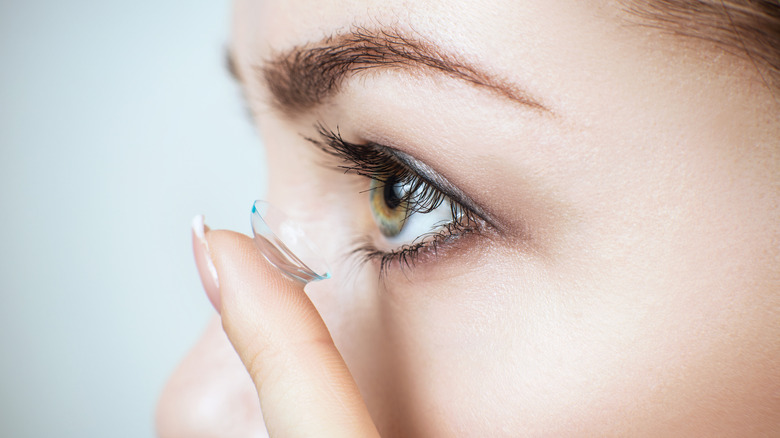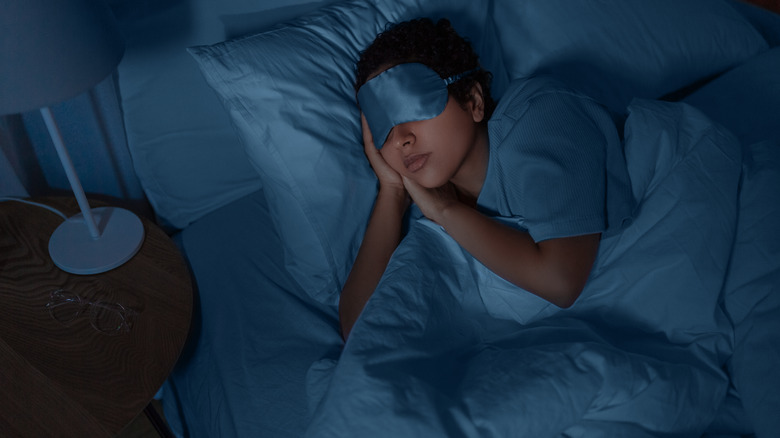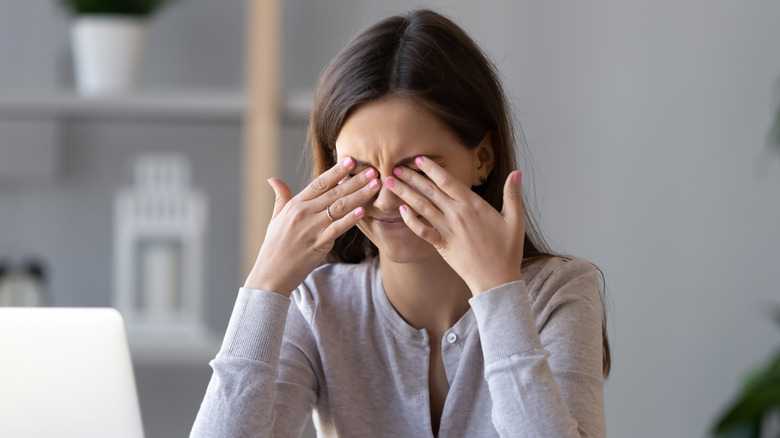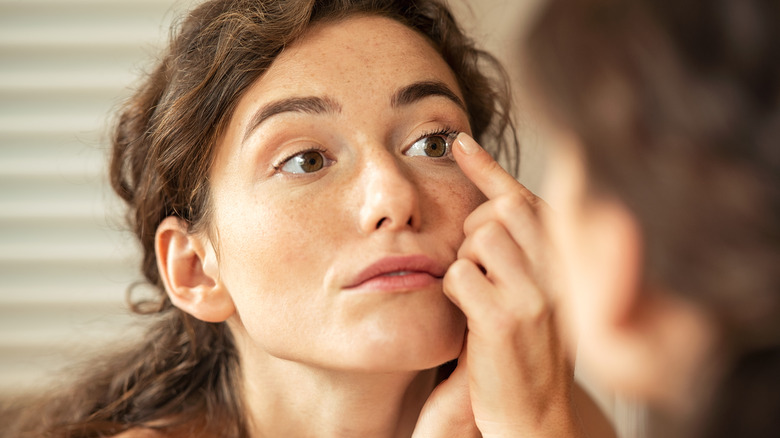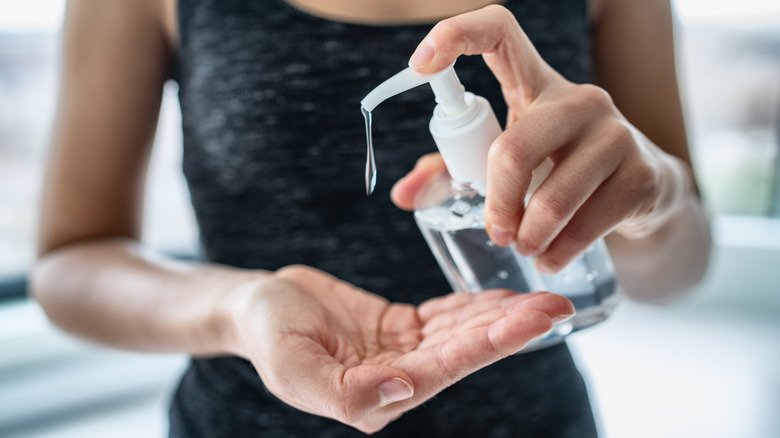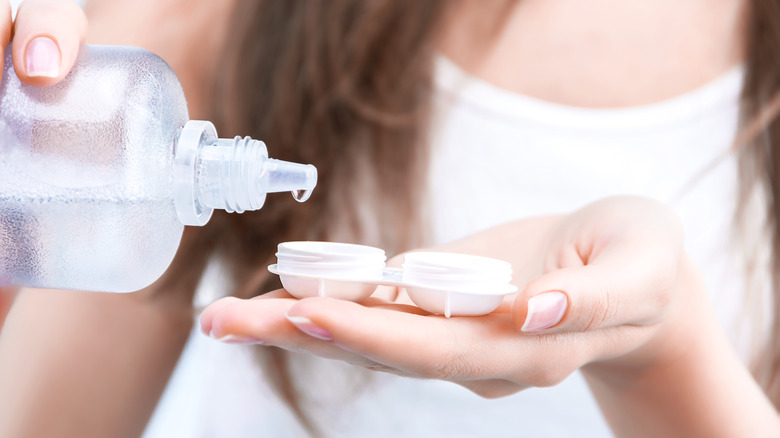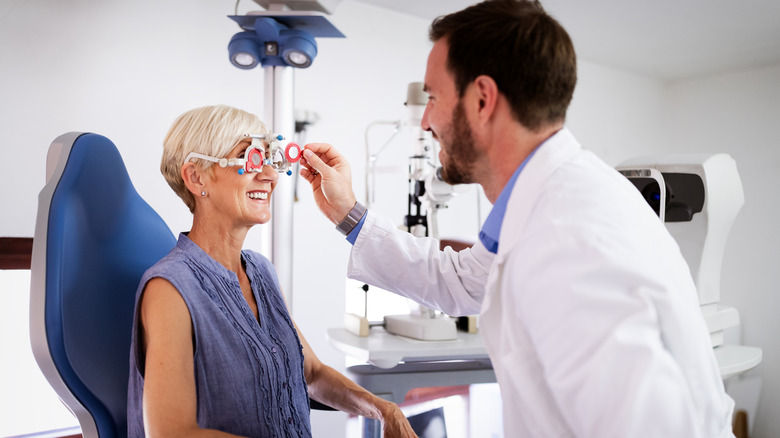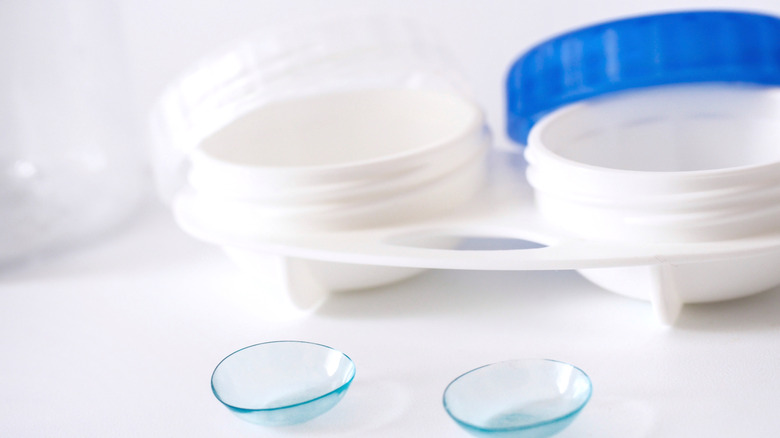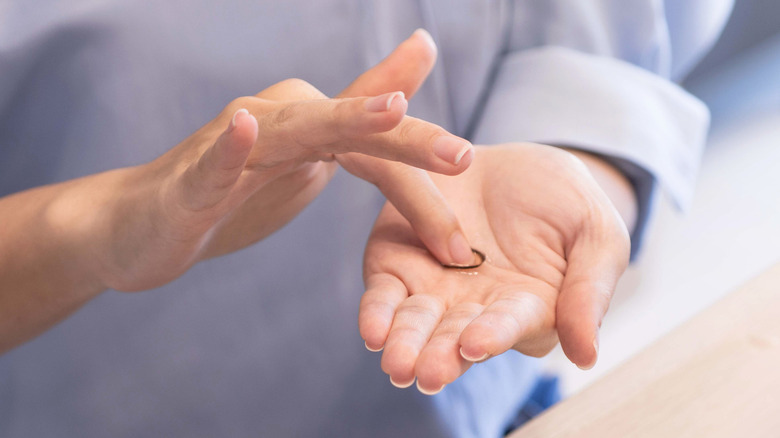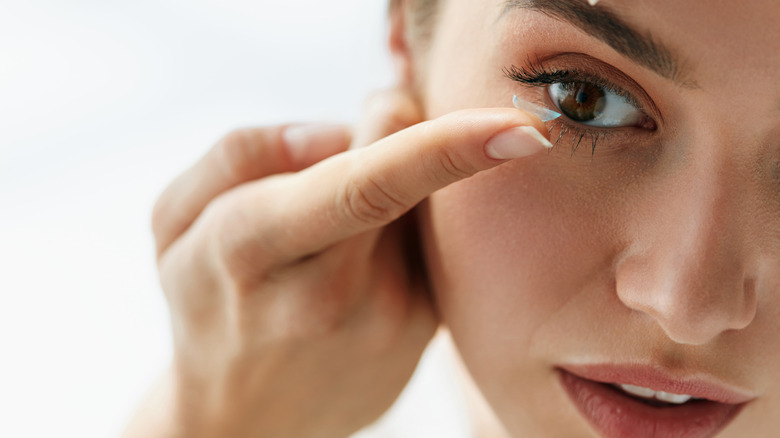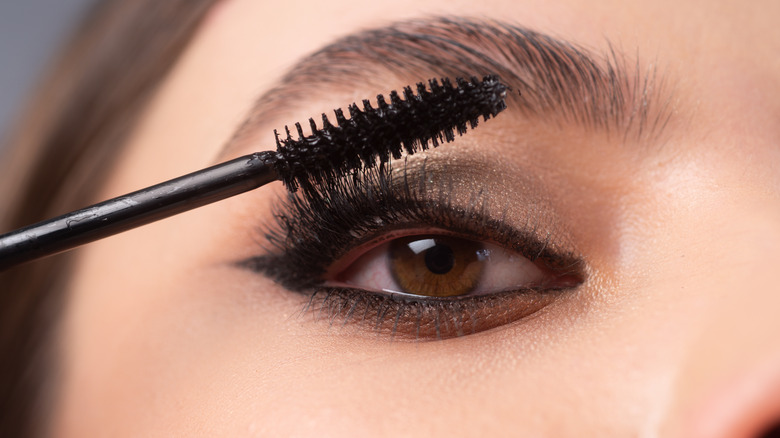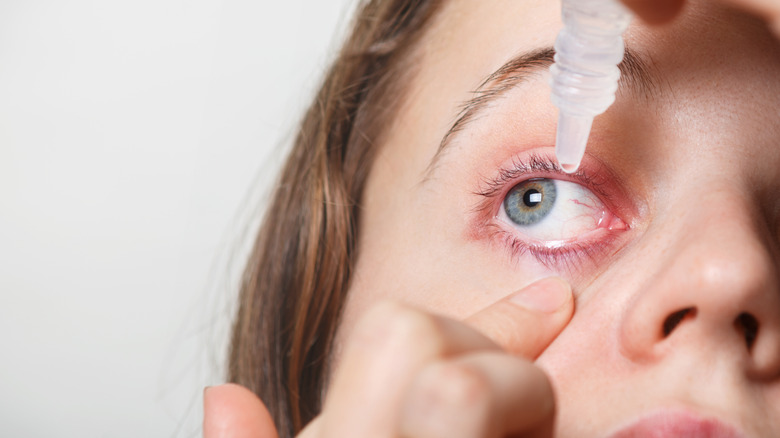Don't Do This If You Wear Contact Lenses
Anyone who's switched from wearing glasses permanently to contact lenses knows that feeling of invincibility when you can finally see the world around you with your own eyes. You feel like Clark Kent, walking around with 20/20 vision without anyone knowing your secret: You're really blind as a bat.
While contact lenses can make life considerably easier — you can do yoga and see the instructor clearly without your glasses hanging on by a thread while in Downward Dog, via Coach Levi — these nifty little vision aids can present you with a slew of problems if you don't take care of them properly. Don't get us wrong, taking care of contact lenses is not complicated; it just requires a little bit of your time and attention each day to ensure you keep them as clean as possible.
Some contact lens no-nos are less evident than others, believe it or not, and some of your daily habits might be putting you at risk for an eye infection. Here's a look at the things you shouldn't do if you wear contact lenses.
Sleeping without removing your contacts
Most contact lens wearers tend to engage in risky behaviors when it comes to the "rules" associated with wearing them. The general mistake most people make is sleeping in their contact lenses. A study published on the National Library of Medicine found that one-third of contact lens wearers fall asleep without removing their lenses at some point. Given that this habit makes it six to eight times more likely that you'll develop an infection, via the Sleep Foundation, it's concerning that people don't take it more seriously. What's even scarier is that the illnesses associated with sleeping in contact lenses can often cause individuals to lose some of their vision or go blind entirely. This is especially true with infections caused by bacterial keratitis, which is primarily driven by sleeping with contact lenses, The Centers for Disease Control and Prevention inform.
You might feel relieved that your contact lenses are FDA-approved for sleep." As it turns out, you shouldn't use that as an excuse, ophthalmologists say. Allison Babiuch, M.D., told Cleveland Clinic that you shouldn't take the risk even if your contact lenses are approved for sleep. Danielle Richardson, O.D., agrees. "Patients who sleep in contact lenses are more at risk for eye infections like microbial keratitis and corneal ulcers," she told Well+Good. When you fall asleep in contacts, Babiuch warns that the dryness that results can cause damage to your eyes when you try to pull the lens off, increasing your risk for infection.
Continuing to wear contacts when they're causing you discomfort
If your contact lenses feel uncomfortable, don't wait it out; instead, remove them and schedule an appointment with your optometrist. A variety of factors can contribute to contact lens irritation, so you shouldn't ignore it. When you first experience such misery, the experts at Feel Good Contacts recommend you take out the particular lens, clean it, and put it back in your eye. If discomfort continues, take it out again and take a closer look. The lens might be torn, which could be the reason for your discomfort. If this is the case, throw it away. If you can't find anything wrong with the lens, it's time to contact your optometrist. According to the Optometrists Network, you might have dry eyes, allergies, or corneal irregularities causing the discomfort.
Danielle Richardson, OD, told Well+Good that it's best not to ignore your body's cues when wearing contact lenses. Even if you've been wearing contacts for years, you should remain vigilant. And though your contact lens prescription doesn't include a specific amount of hours you're allowed to wear them per day, you shouldn't keep wearing them when you find yourself rubbing your eyes constantly or realizing that they're starting to feel uncomfortable. "Length of contact lens wear is determined by a patient's comfort level, dryness level, and visual demands so that it will be different for each patient," Richardson says.
Wearing contacts for much longer than they are prescribed
The following statement may upset many optometrists, but Alisha Fleming, O.D, did not mince words when asked about extended contact lens wear by SELF. "It is terrible to wear the same contact lenses for a long, long time," she said. "Would you go days without brushing your teeth or wear the same underwear for days without washing?" Well, of course not! So it seems that those who try to save some dollars by extending the time they wear their monthly lenses are due for a stern talk.
Vivian Shibayama, O.D., also speaking to SELF, said that one of the side effects of wearing contacts for longer than prescribed is blurry vision due to a build-up of proteins and microorganisms on the lenses. You might also end up with eyes that feel very dry because contact lenses tend to lose their ability to retain moisture after prolonged use. If that's not enough to put you off, your risk of infection also increases. "Lens materials start to break down after their approved wear period," Ann Morrison, O.D. told SELF. This means bacteria can enter your eyes more easily. "I always tell my patients that the cost of treating complications from contact lens overwear can cost far more than the cost of replacing the lenses appropriately," Morrison says.
Inserting and removing contacts without washing your hands first
If you frequently suffer from pesky eye infections, you might want to pay closer attention to what you do before touching your eyes or contact lenses. Bacteria are everywhere, and the last thing you want to do is transfer them to your eyes. Scott McRae, M.D., who is a professor of ophthalmology and visual science at the University of Rochester, told Cosmpolitan that neglecting to wash your hands before handling your lenses can lead to severe infections you don't want to deal with.
Echoing this sentiment, Danielle Richardson, O.D., told Well+Good that touching your contacts with dirty hands not only transfers potentially harmful bacteria to the lens, but the lens, in return, will transfer it straight to your eyes. Bacteria are really smart, and they move all around," MacRae cautions. So next time you need to remove or insert your lenses, wash your hands first!
Reusing contact lens solution
Raise your hand if you're guilty of this: Many people like to think they're saving dollars when reusing contact lens solutions, but the truth is that they're going to be paying far more to get rid of the eye infection that will surely follow.
Ophthalmologists Rebecca Taylor and Andrea Thau spoke to HuffPost about the bad habits of some contact lens wearers, and as expected, the reusing of contact lens solutions is one of them. Doing this almost guarantees that you'll develop an eye infection. Just like you wouldn't wash your dishes in the same dirty water day in and day out, you shouldn't reuse contact lens solutions under any circumstances. All the bacteria and microparticles that come off your lenses at the end of the day drift around in the solution. Reusing this solution means you're simply plunging your lenses back into bacteria instead of cleaning them. Should you have any small tears in your cornea, these microorganisms will happily infest it, and you'll be left wishing you had taken five seconds to throw out the used stuff.
Ophthalmologist John Bartlett told Healthline that even a tiny amount of leftover solution topped off with fresh contact lens solution could cause problems since it can be contaminated by the existing bacteria, making it less effective. His advice is to empty the contact lens case when you put in your lenses and allow them to dry completely.
Ignoring possible allergic reactions to contact lens solution
Did you know that you can be allergic to your contact lens solution and even some contact lenses? While seasonal allergies can definitely impact your eyes negatively, it's a good idea to consult your optometrist if you continue to experience itchiness and redness, Richard Gans, M.D., warns in an article he wrote for Cleveland Clinic.
The contact lens solution you use can significantly impact your eye health. Deborah S. Jacobs, M.D., told The American Academy of Ophthalmology that people prone to allergies or suffer from other medical conditions like eczema or atopy are more likely to react to contact lens solutions, especially multipurpose variety. Jacobs explained that the more functions a contact lens solution provides, the more complex its list of ingredients becomes. These extra ingredients found in multipurpose solutions tend to trigger allergic reactions in some people.
There's also the case of silicone hydrogel materials used in contact lenses, which can also trigger an allergic reaction. These lenses are often prescribed due to their ability to allow more oxygen to pass to the eyes. According to Bruce H. Koffer, M.D., some contact lens solutions don't mix well with these lenses, causing irritation. Don't ignore it if you experience irritation after switching to new lenses or solutions. Pay a visit to your optometrist so they can help find the cause.
Swimming and showering with your contact lenses
You might argue that swimming and showering with your contacts are the main reasons you wear them for extensive periods. You want to have crystal clear vision wherever you go and for every activity, something glasses cannot always provide. As it turns out, you're putting yourself at risk for serious infections and even vision loss if you wear your contacts while having fun in the pool or showering.
The U.S. Food & Drug Administration cautions that contact lenses shouldn't come near water — this includes swimming pools and the shower, as well as natural bodies of water like the ocean and lakes. When you expose your lenses to water for a prolonged period, like taking an afternoon swim, some of the water could be absorbed by your lenses, along with the bacteria and viruses it harbors. Natural bodies of water, like the ocean, are even riskier because their bacterial makeup is more diverse than that of a pool, per Healthline.
Showering with your contacts poses the same risks and can make you more prone to developing eye infections, dry eyes, and even inflammation. The most significant danger, however, is developing Acanthamoeba Keratitis. Caused by the Acanthamoeba bacteria, which can be present in all types of water, including tap water, it's tough to treat and can even lead to vision loss. Your best bet is to remove your lenses, and if you're a pro swimmer, speak to your optometrist about prescription goggles.
Wearing contact lenses when you're sick
This might seem like an odd thing to do, but opting to wear glasses while you're sick is best for your eyes. Wesley Hamada, OD, told Bustle that eye infections are most likely to occur when your immune system is already maxed out from fighting the flu or a cold. This means that it won't be able to effectively fight off the bacteria your contact lenses might introduce to your eyes.
Lisa Park, an ophthalmologist at Columbia Doctors, pointed out to AccuWeather that wearing contact lenses while sick puts you at risk for eye infections like pink eye because this infection is induced by the same virus that causes common colds. Park suggests you treat contact lenses as an infectious object when you're sick, adding, "We know that there is bacteria that is held into place; it's considered a biofilm." "If you have any infectious processes going on, it's just not a good idea to have that on the surface of the eyes, where that can't be washed away by your natural immune system and the tears," Park explains.
Not going for a yearly checkup
When you wear contact lenses, it's important to schedule a yearly checkup so your optometrist can evaluate whether your current lens prescription still fulfills your needs. Wesley Hamada, OD, told Bustle that annual checkups are incredibly important to ensure that your eyes are healthy and tolerate the lenses well. These checkups can also serve as an opportunity to tell your optometrist if your lifestyle has changed to such an extent that you might need another type of prescription.
Eric Donnenfield, F.A.C.S., and board-certified ophthalmologist, told the Refractive Surgery Council that it's vital that patients don't skip their annual eye exam because of the risks contact lenses pose. He encourages patients to discuss any irritation they might experience with their doctor, whether excessive dryness, redness, or pain. This can help them provide you with a better prescription that offers more comfort while ruling out any other issues. Donnenfield also warns that wearing contact lenses causes less oxygen flow to the eyes, which can adversely impact eye health and result in irreversible damage. Therefore, it's best to have your eyes checked out every year.
Using the same lens case for an extended period of time
You're already aware that you shouldn't reuse your contact lens solution, but what about the contact lens case? According to the American Optometric Association (AOA), three months is the longest you can use one contact lens case. This is because bacteria can still flourish in the case even if you fill it with a new contact lens solution every day.
Robert C. Layman, OD, and president of AOA, told Livestrong that using contact lens cases for extended periods allows biofilm and bacteria to thrive. Speaking to The Healthy, Christopher J. Quinn, former president of AOA, said that the biofilm that forms in contact lens cases could help protect the bacteria from the solution's disinfectants. So even though the case seems clean, it's really a breeding ground for bacteria. Layman warns that these bacteria can increase your risk of developing vicious infections that can attack and inflame your cornea, like microbial keratitis and infiltrative keratitis. These infections can, in some cases, cause blindness, so the next time you can't remember when last you replaced your contact lens case, it's definitely time to toss it.
You don't clean your contacts properly
As it turns out, you actually need to follow a cleaning regimen every time you take your contact lenses out. The American Optometric Association (AOA) recommends applying a small amount of contact lens solution to the palm of your hand and gently rubbing the lens for two to twenty seconds, depending on the type of contact lens solution you use. While this might seem ludicrous, especially when the brand of contact lens solution explicitly states that it's a "no-rub," solution, you should still take the time to do it.
A study published on the National Library of Medicine found that not rubbing your contact lenses after wear leaves plenty of deposits still sitting on the lens — in short, it's not clean. Even if the manufacturer advertises the solution as one that does the rubbing for you, so to speak, it's not nearly as effective. So get ready to rub; the health of your eyes depends on it.
You put in your contacts after applying makeup
One of the perks of wearing contact lenses is that you can finally show off your eye makeup without your glasses covering it up. You should, however, only apply makeup after you've inserted your contacts. Not only will you be able to see better while applying the makeup, but you'll also avoid getting small particles of your eyeshadow and mascara on your lenses when you insert them, Eddie Eisenberg, a senior optometrist at EZ Contacts, told The Healthy. This will also prevent irritation and is a great way to prevent infection. In general, rubbing at your eyes all day and just having debris on your lenses can lead to issues like corneal ulcers.
When it's time to remove your makeup, Eisenberg advises taking out your contacts first for the same reasons mentioned above — you can easily rub mascara onto your lenses while trying to remove it from your lashes. If you happen to get mascara on them, simply follow your usual cleaning regimen, which includes rubbing, and the mascara marks should go away overnight.
You use makeup that's hazardous to your contact lenses
Not all makeup is created equal, and this is especially true for contact lens wearers. To keep your lenses and eyes in good shape, you'll have to get picky about your makeup. In general, wearing eye makeup poses some risks, even if you're not a contact lens user, but sporting contacts puts you at a higher risk for developing irritation and even infection.
A study published on Eye & Contact Lens: Science and Clinical Practice found that eye makeup products like pencil eyeliner are one of the main culprits. Small particles from this product tend to easily make their way into the eyes and mix with the tear film, which means you basically have makeup mixed up in your eyes all day long. This is a recipe for trouble. The same goes for mascaras that contain fibers. Optometrist Susan Resnick told Byrdie that these fibers could quickly end up on your lenses — or worse — underneath them, causing discomfort.
When it comes to eyeshadows, use a primer, so there's less chance of the particles falling off and ending up in your eyes. You can also opt for cream shadows instead. Resnick told Allure that products containing oils are also a big no-no since the oil can make its way into your eyes, causing cloudy lenses. Last but not least, check whether the eye makeup you buy has been ophthalmologist-tested and is hypo-allergenic.
You use regular eyedrops
It's certainly understandable if you thought all eye drops were the same. As it turns out, wearing contact lenses means you need to start reading the labels. The American Optometric Association (AOA) warns that not all eye drops are compatible with contact lenses and can even cause damage to your eyes and the lens. Check the ingredient list if you're unsure whether eye drops are safe to use with contacts. If the drops are preservative-free, they are generally safe to use with contacts, and if not, don't risk it. Some preservatives can severely harm your eyes if you wear contacts.
Optometrist Eddie Eisenberg told The Healthy that some of the chemicals in regular eye drops could be absorbed by contacts, causing your eyes to sting for hours. Mostly, it's safe to instead opt for eye drops that explicitly state that they are safe to use with contacts. According to Verywell Health, the best eye drops for contact lens wearers are rewetting eye drops. While dry eye drops might seem tempting if you tend to suffer from dryness, you should avoid using them with your contacts since they typically cause blurriness.
